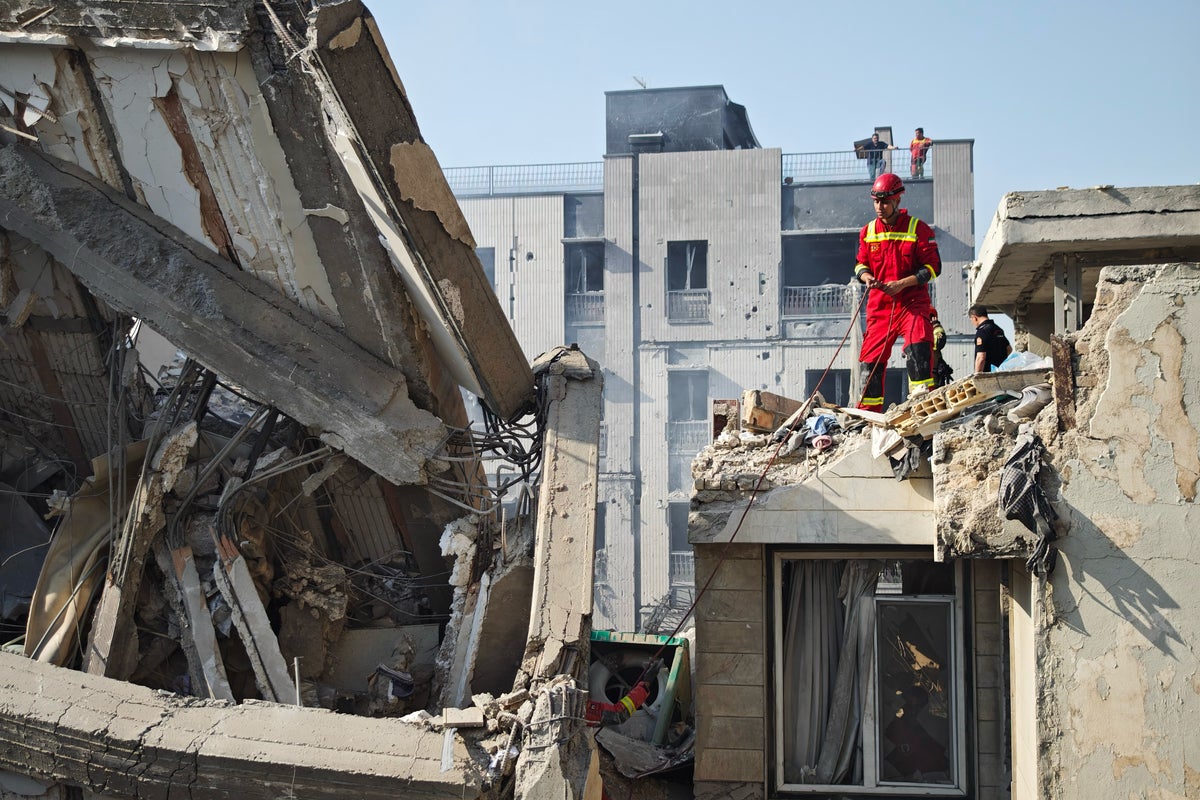Israel’s massive overnight barrage of strikes on Iran could be the most significant attack on the country since its devastating war with Iraq in the 1980s.
It pushes an already broiling Middle East – where slaughter has become a daily reality for so many – to the very edge of another regional bloody conflict.
The deep concern here is that rather than this being another exchange of salvos between Israel and Iran: the arena of a remote war between two nations that lie 2,000 km apart will actually play out on the ground of all the countries in between.
To explain, Israel’s bombardment (that it has justified as “pre-emptive”) has apparently killed two of the most powerful military figures in the country.
Iran’s elite Revolutionary Guard parliamentary group (IRGC), said its leader Hossein Salami as well as the chief of staff of the Iranian armed forces, General Mohammad Bagheri, Iran’s highest-ranking army officer, were among the dead.
Iranian state media reported that the strikes also took out Senior IRGC official Gholam Ali Rashid, as well as two of the country’s most prominent nuclear scientists Fereydoun Abbasi and Mohammad Mehdi Tehranchi.
It is notable that western leaders were quick to distance themselves from Israel’s operation.
US Secretary of State Marco Rubio, pointedly said that Washington’s closest ally in the region took “unilateral action against Iran”. (Although President Trump did alert the world to something on the horizon when he evacuated some personnel from embassies in the Middle East region earlier this week).
“We are not involved in strikes against Iran and our top priority is protecting American forces in the region,” Rubio said in a statement edged with a kind of desperation.
The US was expected to hold a sixth round of negotiations with Iran on Sunday in Oman over Tehran’s rapidly advancing nuclear programme – talks which will likely not go ahead now.
The fact Israel’s attacks were “unilateral” was again echoed by Nato Secretary General Mark Rutte – who said on Friday it was “crucial” Nato allies work to deescalate the situation.
In the Middle East it feels like a collective inhalation of breath was taken.
This conflict has already exploded above the skies of Jordan, which has the unhappy misfortune of being on a missile flight path. Amman said on Friday morning it has had to intercept a number of missiles and drones that entered its airspace, which is now closed.
In Iraq – civilians on the ground in Baghdad told me they initially thought they were under attack as they spent a sleepless night hearing explosions.
Iraqi officials worry that the “mess” between Israel and Iran could drag in Iraq, where Iran-backed militias are among the most powerful factions operating.
There are concerns that these Iraq-based but Iran-backed paramilitary groups might launch retaliatory attacks on US assets within the country, which might in turn see US counter-strikes against the country.
Here in Damascus, there are similar fears of a deadly spill over – especially as Israel already said on Friday it was intercepting Iranian drones over Syria.
Syria is bordered by Israel, Lebanon, Iraq and on a potential missile flight path to and from Iran. Here a nascent rebel-led administration has been desperately trying to extricate itself from regional conflicts that the ousted Iran-backed Assad regime so readily embroiled its country in.
After 14 years of bloody civil war between rebels and Assad’s forces backed by Iran and Russia, the Islamist fighter Ahmed al-Sharaa turned Syrian president is trying to stamp out all these paramilitary groups that ruled the country with an iron grip for so long.
Many now fear that some of these elements remain in Syria and could use this moment to attack Israel and derail Syria’s rebirth.
Just last week Israel bombed again several positions in southern Syria after it claimed projectiles were fired from Syria into the Israel-occupied Golan (the Syrian government official response was that it is investigating the incident).
Syrian analysts told me today that the main concern is that those responsible for the missiles may have been Iran-backed groups that still remain inside Syria and that Iran will use their “elements and cells” within the country to continue attacking Israel, escalating the conflict. Syria – like Iraq – as whole will suffer if Israel chooses to retaliate against the entire country.
In the unstable south-western borderlands between Syria and Israel I saw myself this week Israel positions inside Syrian territory – an action Israel justifies as necessary for its own security.
Residents of the border towns like Hader told me Israeli patrols already frequently enter their villages and towns and set up temporary checkpoints. They have even detained Syrian citizens, whose fates remain unknown.
Elsewhere in the Gulf there are also warnings that commercial ships could be targeted in regional waters over the tensions.
Regional conflict surely scuppers any hope of ceasefire for Gaza. There, Israel’s unprecedented bombardment of the tiny strip has killed tens of thousands of people – millions are on the cusp of famine and dozens of Israeli captives, held by Hamas militant group since 7 October 203 deadly attacks, are also at risk of death.
It is unlikely that in these circumstances Israel and Hamas, which is backed by Iran, will engage in any talks.
And so Israel’s unprecedented attack on Iran has the region on a precipice.
The future, whichever way you look at it, is bleak.

